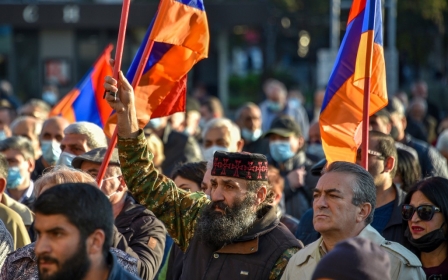Assassination of PM foiled as Armenia withdraws from Nagorno-Karabakh

Armenia said it foiled an assassination attempt on Prime Minister Nikol Pashinyan and an attempt by former officials to take power after he agreed to a ceasefire with Azerbaijan in the Nagorno-Karabakh region.
Pashinyan has come under pressure from thousands of protesters demanding his resignation following the ceasefire deal in Nagorno-Karabakh that led to Azerbaijan taking control of the area on Sunday and ended fighting that had taken place since late September.
Stay informed with MEE's newsletters
Sign up to get the latest alerts, insights and analysis, starting with Turkey Unpacked
While Nagorno-Karabakh is internationally recognised as part of Azerbaijan, its population is mostly Armenian, and the region had been under the control of Yerevan-backed separatists since a war in the early 1990s. Much of that territory had already fallen to Azerbaijani forces prior to the ceasefire agreement.
Azerbaijan announced on Sunday that Armenian withdrawal from Kalbajar district of Nagorno-Karabakh, , was however postponed to 25 November.
The Armenian National Security Service (NSS) meanwhile said its former head, Artur Vanetsyan, the former head of the Republican Party parliamentary faction Vahram Baghdasaryan, and war volunteer Ashot Minasyan were under arrest.
"The suspects were planning to illegally usurp power by murdering the prime minister, and there were already potential candidates being discussed to replace him," the NSS said in a statement.
Vanetsyan was arrested on Saturday after being summoned to the headquarters of the Armenian security forces, his lawyers Lusine Sahakyan and Ervand Varosyan said.
Known for his links to Russia, Vanetsyan had been briefly detained along with other senior opposition figures during anti-government protests which saw the prime minister called a "traitor".
'No choice but to surrender'
Pashinyan said earlier this week he had no choice but to sign the agreement to prevent further territorial losses. He said he was taking personal responsibility for the setbacks, but rejected calls to step down.
The ceasefire halted military action in and around Nagorno-Karabakh. Under the agreement, 2,000 Russian peacekeeping troops are being deployed to the region.
Armenians living in one part of the disputed region said they burned their homes before handing over their village to Azeri forces.
Last month, Amnesty International and Human Rights Watch said they found evidence that Azerbaijan had used Israeli-made cluster bombs in Nagorno-Karabakh.
Turkey has also publicly backed Azerbaijan, with Ankara providing weapons to Baku and Turkish President Recep Tayyip Erdogan putting his weight behind Azeri President Ilham Aliyev.
Since 1994, ethnic Armenians had held military control over all of Nagorno-Karabakh and substantial areas of Azeri territory surrounding it. They have now lost much of the enclave itself as well as the surrounding territory.
Middle East Eye delivers independent and unrivalled coverage and analysis of the Middle East, North Africa and beyond. To learn more about republishing this content and the associated fees, please fill out this form. More about MEE can be found here.





